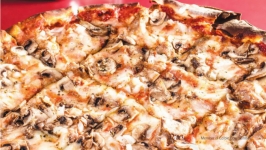Behind the Kitchen Door
The Milwaukee Restaurant Ecosystem
There are an estimated 1,300 restaurants in Milwaukee, with more than 50 opening in the past year. These range from neighborhood mom-and-pop operations to expensive gustatory palaces, each of them vying for the attention and dollars of an increasingly savvy audience.
What’s remarkable about this burgeoning scene is that when digging at the roots that anchor and connect these establishments, some familiar faces emerge cloaked in chef’s whites. As much as restaurants live or die by their food, their leadership and staff play perhaps an even more important role.
The chefs who have worked in these kitchens are as numerous as they are talented, and each of them has taken something from his or her experience that has shaped an approach to subsequent roles. Together, this deeply interconnected network of chefs and owners has helped Milwaukee become recognized as one of the top food cities in the nation.
For the Love of It
“Milwaukee has come a long way,” says Joe Bartolotta, co-owner of The Bartolotta Restaurant Group. “The growth is expansive. It’s awesome. Part of what makes it so special is that the community of chefs is really cool.”
If there’s anyone that understands the dynamic that exists between chefs, it’s Bartolotta. Many of them have worked for his company at some point during their careers in this city. With more than a dozen successful restaurants, a busy catering operation, and a slew of new concepts on the way, the Bartolotta Restaurants have grown steadily since the opening of Ristorante Bartolotta in Wauwatosa in 1993. Today the group employs around 1,100 people.
He’s hardly the first to notice an uncommon camaraderie among restaurants and chefs in Milwaukee; others have been saying it for years. But he does have some personal experience that might explain it.
“Years ago when I was first starting in the business, I moved to New York. Being a Midwesterner, I was immediately conscious of being different. But my work ethic, my patience, and my kindness helped me climb the ranks very quickly. I was embraced because I was different. A lot of the homegrown talent here has those values, and their personalities are what make Milwaukee a little bit different, a little bit special. That transfers into the kitchens.”
This preponderance of Midwestern nicety among chefs isn’t surprising, considering many of them worked together at some point or have forged bonds through mutual friends, a general desire to be supportive, or shared culinary interests and philosophy.
Justin Aprahamian, chef/owner of Sanford, said that he sees a ripple effect of sorts when chefs admire what their colleagues are doing and, maybe more importantly, why they’re doing it. “There’s a lot of passion driving what’s happening here. We want to make guests happy every night. We’re friends with a lot of people in the city, and I know that sentiment carries through in a big way. We’re doing it for the love of it.”
Hospitality DNA
The mutual support among Milwaukee chefs is evident in their shared histories. If one were to chart their connections through the kitchens in which they worked, the result would be a web linking the best restaurants in the city and beyond.
Some chefs, for instance, have worked at multiple restaurants within the same ownership group. In this regard, Milwaukee is not unlike larger cities, where success can empower proliferation. The number of the city’s multi-restaurant groups is growing, as are the number of restaurants within them. Therefore, it can be common for chefs to move around within a group or return to one after time spent elsewhere.
The Bartolotta group’s current executive chefs alone have spent time in dozens of local kitchens—Dane Baldwin of Mr. B’s, for example, worked at Gil’s Café, Dancing Ganesha, Barossa, Café Calatrava, Carnevor and Graffito, as well as within the Bartolotta group at Harbor House and Bacchus, where he was named Back of House Employee of the Year in just his first year.
“I know I’m in the back of the house, but I’m in the hospitality business,” he said of the ethos that permeates many Milwaukee kitchens. “It’s really important that people leave our restaurant happy—I’m emotionally and professionally invested in that. We all are. People look forward to going somewhere every day where they can count on support.”
This support is manifested in respect and patronage from other chefs and from owners. For instance, Aprahamian said it’s important to him to scrub the line with his team at the end of a shift.
“Humility is important, as is respect for the people you work with. We’re all working in the same direction. What we do here is very fulfilling in that we can sustain business doing things the way we want to do them, and do them as a team.”
Chef-Extraordinaires
A slew of highly-regarded independent restaurants are also an important part of the Milwaukee restaurant ecosystem, and have served as launchpads for those who have gone on to run their own places.
Perhaps the best example is Sanford, long considered one of the best restaurants in the Midwest under the guidance of former chef/owner Sanford D’Amato and now under Aprahamian. Both chefs have been awarded the title Best Chef Midwest by the James Beard Foundation.
Nick Burki and Chris Hatleli, co-owners/chefs of Café Coquette, worked together at Sanford before eventually buying Coquette from D’Amato. Dave Swanson, chef/owner of Braise Restaurant & Culinary School, himself nominated three times for Best Chef Midwest, spent six years as chef de cuisine at Sanford. Other Sanford alumni include Kevin Sloan, executive chef of the Pabst Theater group, and Erica Elia, co-owner of Classy Girl Cupcakes.
Andrew Schneider, chef/owner of Le Rêve Patisserie & Café, worked at Café Coquette, as did his current chef de cuisine Patrick Murphy, who also worked at Sanford. Abelardo Guaderrama, pastry sous chef at Le Rêve, worked at both Sanford and Café Coquette.
Ramses Alvarez, corporate chef at Water Street Brewery, Thi Cao, executive chef of Bistro Z, and Dave Magnasco, chef/owner of Chef’s Table, have all spent time at Café Coquette.
Another chef who has lit his share of burners is Mark Schmidt, currently executive chef and directory of culinary operations at Concordia College in Moorhead, Minnesota. In addition to apprenticeships at Sanford and Coquette Café and stints—some long, some short—at Beans and Barley, Grenadier’s, Trocadero, and Libiamo, Schmidt spent years with the SURG Group at Mi-Key’s, Charro and Umami Moto before landing at Lake Park Bistro.
“It was black and white,” he said, comparing the Bartolotta kitchen to most of his previous stops. “It’s such a well-oiled machine. There were people that came in an hour or two early, off the clock, every day, just so they could have a nice, easy night—enjoy their prep, have time to clean, no rushing. Every chef dreams of having a staff like that. Adam Siegel did a great job putting that together.”
Siegel, Bartolotta’s corporate chef and the executive chef at Lake Park Bistro, said that the group’s approach to assembling top-notch teams revolves around training and structure, and result in those employees taking those skills and lessons with them up, hopefully up the company ranks.
“Something I’ve taken from every chef I’ve ever worked for is that the more time you spend learning, the better. It’s part of why we have a great history of retaining talent. A chef might be a line cook at two or three of our restaurants, and then become a sous chef at one or more, and move up the ladder that way. I encourage them to experience different kitchens and personalities.”
Bartolotta said that although departures can be bittersweet, those who find success make him proud. “Zach and Sarah Baker at Pizza Man both spent years with us. They’re great people doing great things at Downer and Mayfair. Mark Weber was our opening chef at Lake Park Bistro before leaving to start his own business. I like him an awful lot. He was one of my favorites. Vincenzo Betulia, who worked at Ristorante, now has a really successful place of his own down in Naples, Florida. I’m happy for all of them.”
The number of chefs who are Bartolotta alumni is staggering. Those who have gone on to run, own or play a significant role in other ventures include Carnevor’s Jarvis Williams, Mason Street Grill’s Mark Weber, Joe Schreiter of Sheridan’s, Pastiche’s Mike Engel, Café Calatrava’s Micah Kaufman, Locavore’s Van Luu, Ardent’s Matt Haase, Atlas BBQ’s Michael Strand, the Paddock Club’s Lynn Chisholm, University’s Club’s Matt Kerley, and many more. Others have gone on to be culinary instructors, such as Michelle Evans of Braise and MATC, and Sean Jones of St. Paul College in Minnesota.
Audrey Vandenburgh, executive chef at Potowatomi’s Wild Earth Cucina Italiana, has been executive sous chef at The Pfister Hotel, where she helped open Mason Street Grill. Having also opened SPIN Milwaukee and other restaurants, she stresses the importance of putting the right systems and mindset in place to ensure success, a philosophy she saw executed particularly well during her time as sous chef at Lake Park Bistro.
“It was certainly the most professional kitchen I had worked in at that time. There were very exacting standards, and a high level of structure. I draw on that to try to instill in my chefs a sense of pride in what they’re doing, both for the restaurant and for themselves.”
Looking Ahead
Despite the challenges of differentiation in a market where consumers also have high standards, Milwaukee restaurants have more in common that it might seem.
“I think Milwaukee chefs really grasp the farm-to-table movement really well, because we have such great agriculture,” said Siegel. “I applaud them for that, especially smaller restaurants for whom farmfresh food is a lot more expensive sometimes; how they’re making that work for them is great.”
“Making it work” through a keen desire to innovate is paying dividends for these chefs. Because their relationships with and respect for one another tend to defy the stereotype of cutthroat competition and one-upsmanship, Milwaukee food doesn’t lack in creativity.
“Younger chefs want it all a lot faster,” said Bartolotta. “So they’re willing to take chances. There are some wonderfully talented young people out there right now, and they’re challenging us. They’re challenging everybody. They have this amazing blank canvas and they’re doing some really creative stuff.”
This notion is borne out by proof that Milwaukee’s network of chefs have and will continue to support one another the old fashioned way—by eating each other’s food.
“I really like Red Light Ramen,” said Aprahamian when pressed for local favorites. “Tutto has the best veal in the city, and they’re good people. The crews at Hinterland and Goodkind are always doing awesome stuff. I ate at Palomino recently and the fried chicken was great. Joe Muench is really dialed in at Blue’s Egg and Story Hill BKC. I wish I got out more!”
No matter where they come from, who they know, or where else they may have donned a chef’s coat, the members of Milwaukee’s restaurant ecosystem are made stronger through a shared desire to continue elevating the city’s profile by cooking the best food they know how, and to support each other while doing it.
“It’s created a neighborhood, and I think that’s really cool,” said Bartolotta. “I’m proud to live here and be a part of it.”
A Who’s Who of Some of the Prominent Restaurant Groups in Milwaukee
The Bartolotta Restaurants
With more than a dozen successful restaurants, a busy catering operation, and a slew of new concepts on the way, the Bartolotta Restaurants have grown steadily since the opening of Ristorante Bartolotta in Wauwatosa in 1993. Today the group employs around 1,100 people at its stable of restaurants: Ristorante Bartolotta, Lake Park Bistro, Bacchus, Mr. B’s, Harbor House, Rumpus Room, two Joey Gerard’s locations, Pizzeria Piccola, Northpoint Custard, Miss Beverly’s Deluxe Barbeque, and Bartolotta Catering & Events, which handles all catering at Pier Wisconsin, and the Grain Exchange downtown.
Much like its three outposts at Mitchell International Airport—Nonna Bartolotta’s and second locations of both Pizzeria Piccola and North Point Custard—its most recent venture is building and operating concepts for someone else. The Mayfair Collection along I-94 in Wauwatosa will feature four new restaurants built and staffed by the Bartolotta Group, but owned by Phoenix Development Partners, which is creating the retail center. There will be a pub/tavern, a French café, a fast-casual restaurant, and a hot dog stand-style standalone called Osgood’s, serving burgers, Italian beef, salads and custard.
Mojofuco Inc.
Another of the city’s largest groups, Mojofuco unofficially got its start in 1993 when owners Scott Johnson and Leslie Montemurro opened Fuel Café in Riverwest. The two partnered with Mike Eitel to start the Diablos Rojos group later joined by Eric Wagner. Together, the four operated Fuel Café, Comet Café, Palomino Bar, Hi Hat Lounge & Garage, Balzac Wine Bar, Honeypie Cafe, and BelAir Cantina. After a recent amicable split with Eitel and Wagner, who operate the Lowlands Group, Mojofuco now owns and operates Fuel, Comet, Hi Hat & the Garage, and Balzac; as well as three BelAir Cantina locations co-owned by Kristyn St. Denis along with Fink’s, an east side tavern.
Pie Inc.
Mojofuco’s Johnson and Montemurro recently ceded ownership of Bay View’s Honeypie and Palomino Bar to former partners Valeri and Adam Lucks, a brother-sister duo who started Pie Inc. group to unify their holdings, which also include their growing PieGram wholesale baking business.
The Lowlands Group
Former Mojofuco partners Mike Eitel and Eric Wagner’s latest venture operates five casual, beer-centric, Europeanstyle Grand Cafés, including Café Centraal, Café Bavaria, Café Benelux, and two Café Hollander locations, on Downer Avenue and in the village of Wauwatosa.
SURG Restaurant Group
Owned by Omar Shaikh and Mike Polaski, SURG is home to Carnevor, Umami Moto, Mi-Key’s, Gouda’s Italian Deli, Distil and two locations of hōm Wood Fired Grill, as well as the event and nightlife spaces Bugsy’s, The Garden, Lucid Light Lounge and SURG on the Water. The group also operates the popular tiki huts at Bradford Beach.
Hospitality Democracy
This partnership between Joe and Angie Sorge and Marcus Investments, the private investment arm of Milwaukee’s Marcus family, owns third Ward spots Swig, Water Buffalo, Onesto, Smoke Shack, and Holey Moley Coffee & Doughnuts, as well as burger spot AJ Bombers and the rights to local legend Zaffiro’s Pizzeria & Bar. Outposts of AJ Bombers, Smoke Shack and Holey Moley are relatively recent additions to the list of dining options at Miller Park.
R.C. Schmidt
The first place R.C. Schmidt bought was RC’s Bar on North Ave. in 1974. His empire has grown since then to include four Water Street Brewery locations (Downtown, Grafton, Delafield and Oak Creek), as well as Vagabond, Trinity Three Irish Pubs, The Harp, SoLo Pizza and The Black Rose Irish Pub (both in the former Oakland Trattoria space), two locations of Louise’s (Downtown and Brookfield), and the Water Street Brewery presences at SummerFest and the Wisconsin State Fair.
Black Shoe Hospitality
After partners Daniel Sidner and Joseph Muench found success with the opening of Maxie’s Southern Comfort in 2007, they’ve grown their business to include 160 employees with the addition of two more popular spots, Blue’s Egg and Story Hill BKC. For their success, Sidner and Muench were named this year’s Wisconsin Small Business Person of the Year Award winners.
Potowatomi Hotel & Casino
Potowatomi’s recent addition of a hotel brought with it a new restaurant, Locavore, which expands the culinary choices offered by the already solid Dream Dance Steak, Wild Earth Cucina Italiana, RuYi, a sports bar, a buffet and a food court.
Marcus Restaurants
The estimable hotelier offers first-class dining options including Mason Street Grill and Blu at the Pfister, Milwaukee ChopHouse and Miller Time Pub & Grill at the Hilton, Kil@wat at the Intercontinental, and Ristorante Brissago at the Grand Geneva Hotel in Lake Geneva.
Wild Planet Hospitality
British imports David Price and Chris Tinker joined locals Drew Deuster and J.J. Kovacovich to form the new Wild Planet group, which combines spots both duos had held separately. This lineup now includes Red Lion Pub, Trocadero, Three Lions Pub, Red Rock Saloon, McGillycuddy’s, and Evolution, with a New Orleans-themed restaurant, The Brass Alley, to open Oct. 1 on Old World Third St.
Very special thanks to Lori Fredrich, author of Milwaukee Food: A History of Cream City Cuisine, for her assistance in researching this story.





